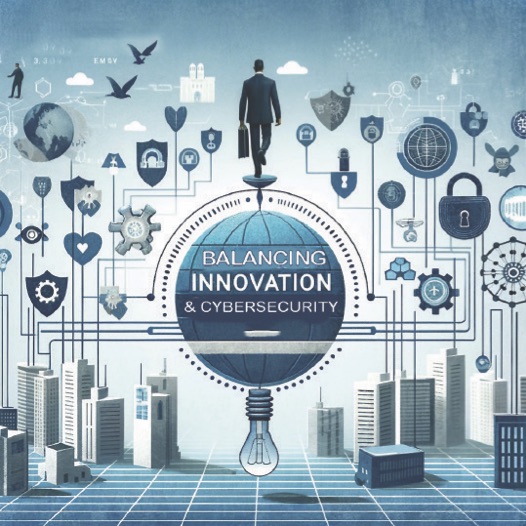By Chinenye Anuforo
[email protected]
For many tech enthusiasts, innovation holds the key to securing Nigeria’s digital future, shaping a smarter, safer and more connected nation that can stand boldly on the global ICT pavilion.
That explains the need for huge investments in innovation.
A major reason to justify the above position played out recently.
John Obi, a tech-savvy individual, found himself caught in the intricate web of a phishing scam. A seemingly innocuous email, disguised as a notification from his bank, lured him into clicking a malicious link.
Within moments, his carefully guarded digital fortress crumbled. The attackers, armed with his sensitive information, wreaked havoc on his financial life.
His bank deposits were drained, credit cards compromised and his digital identity was tarnished. Obi’s experience serves as a stark reminder that even the most cautious individuals can fall prey to these sophisticated attacks.
Also, a prominent healthcare provider, renowned for its commitment to patient care, suffered a devastating data breach.
Hackers exploited a vulnerability in the organization’s network, gaining unauthorized access to a treasure trove of sensitive patient information.
The breach exposed millions of individuals to identity theft, medical fraud, and other serious consequences. The organization faced significant financial penalties, reputational damage, and a loss of trust from its patients.
These two cases illustrate the far-reaching consequences of cyberattacks. The result of identity theft and financial fraud can be life-altering, leading to personal financial losses and, in some cases, irreversible damage to an individual’s creditworthiness. With more Nigerians connecting to the internet for banking and commerce, the threat landscape continues to evolve.
Cost of cyber breaches
Nigeria, like many nations, faces a rising tide of cybercrime. In 2022 alone, the country lost over ₦5.5 trillion to cybercrime, particularly within sectors such as banking, telecommunications, and e-commerce. The Central Bank of Nigeria (CBN) reported that Nigerian banks experienced a 534% increase in attempted cyberattacks during the COVID-19 pandemic, as digital banking surged.
Phishing scams, ransomware attacks, and data breaches are becoming more sophisticated, targeting both individuals and institutions. Hackers exploit weak security systems, outdated software, and the lack of widespread cybersecurity awareness, posing serious risks to our digital economy.
Ransomware attacks, where cybercriminals lock or steal sensitive data and demand a ransom for its release, have become a major concern.
Cyber attacks on Nigerian businesses have far-reaching economic consequences. Beyond financial damage, successful cyber attacks can tarnish corporate reputations, lead to the loss of intellectual property, and even result in legal liabilities.
Small and medium enterprises (SMEs), which make up over 90% of Nigeria’s businesses, are particularly vulnerable due to limited cybersecurity resources and awareness.
NDPC’s perspective
Considering the consequences of increasing cyber threats, the National Data Protection Commission (NDPC) reiterated its efforts to safeguarding the nation’s digital identity and brighten the chances of enjoying a fruitful digital future.
The Commission, as the nation’s data protection watchdog, is implementing stringent data security regulations and raising awareness about cybersecurity best practices.
The ultimate goal is to fortify Nigeria’s digital infrastructure and protect its citizens from the perils of identity theft perpetrated by daring online criminals who patrol cyberspace.
The Chief Executive Officer of NNPC, Dr. Vincent Olatunji, reassured Nigerians of potent solutions and strategies being pooled by the Commission to bolster its defenses against identity theft and data breaches.
Olatunji emphasised that identity management is not just a technological solution, but a strategic imperative. It serves as the bedrock of data security, ensuring that only authorised individuals can access sensitive information and organisational resources.
He stated that the NDPC was taking a multi-pronged approach to address the issue, focusing on both technological solutions and individual awareness.
Key strategies include: robust identity management, zero-trust security model, data privacy and fairness, collaboration with law enforcement amongst others.
He outlined several key areas where identity management plays a pivotal role: access control, minimizing insider threats, compliance with regulations, zero-trust Implementation, reducing attack surface, protecting against credential-based attacks and integrating with other security technologies.
Individuals play a crucial role in safeguarding their digital identities. “By following best practices, such as using strong, unique passwords, enabling two-factor authentication, and being cautious of phishing attacks, individuals can significantly reduce their risk of falling victim to identity and data theft.”
He argued that by prioritizing identity management and data security, organizations can significantly reduce the risk of data breaches and protect sensitive information and build trust with their customers. “As Nigeria continues to embrace digital innovation, it is imperative to adopt a proactive approach to cybersecurity and data protection”, Olatunji stated.
Experts’ opinions and recommendations
In separate interviews, experts told Daily Sun that to combat these threats, individuals and organizations must adopt a multi-layered approach to cybersecurity. This includes staying informed about the latest threats, using strong passwords and multi-factor authentication, being cautious of suspicious emails and links, and regularly updating software and security patches. For organizations, robust security measures, employee training, and incident response plans are essential.
By understanding the risks and taking proactive steps to protect themselves, individuals and organizations can mitigate the impact of cyberattacks and safeguard their digital future.
Adewale Obadare, Founder of Digital Encode, during his keynote address on Cybersecurity & Compliance in Financial Services. He stressed the urgent need for robust cybersecurity measures to protect against these growing threats. He highlighted the increasing complexity of the cyber threat landscape, driven by the rapid advancement of technology and the rise of sophisticated cyberattacks.
Obadare emphasized the inseparable nature of cybersecurity and compliance. He explained, “Cybersecurity and compliance are like Siamese twins. They are about conformance, which creates reasonable assurance in the industry.” This means that organizations must not only protect their systems and data but also adhere to regulatory standards to mitigate risks and maintain trust.
“The financial services industry, in particular, is a prime target for cyberattacks due to the sensitive nature of the data it handles”, he stated.
The rapid advancement of technology, including artificial intelligence, blockchain, and cloud computing, is transforming the financial services industry. While these technologies offer immense potential, they also introduce new security challenges. Obadare noted that Nigeria is at the forefront of technological innovation, with a significant number of organizations adopting AI and blockchain. However, this increased reliance on technology necessitates a heightened focus on cybersecurity.
Obadare called on industry leaders to prioritize cybersecurity and invest in advanced security solutions to safeguard their systems and customer information.
He stressed the importance of a proactive approach to cybersecurity encouraging organizations to shift from a reactive, quality control mindset to a proactive, quality assurance approach. “This involves implementing AI-driven solutions for incident response and threat hunting, as well as fostering a culture of security awareness and best practices.”
Solutions
To address the growing cyber threat, Obadare outlined several key strategies: Robust data protection, employee training, incident response planning, collaboration, risk assessment, AI-Powered solutions, and cloud security.
By adopting these strategies, financial institutions can effectively manage risks, protect their assets, and maintain customer trust in the digital age.
Tajudeen Onyindamola, a cybersecurity expert also argued that to mitigate these risks, Nigerian businesses must invest in cybersecurity solutions such as firewalls, intrusion detection systems, data encryption, and regular security audits. “Additionally, employees must be trained to recognize and respond to cyber threats, as human error remains a leading cause of security breaches”, he stated.
“To address these challenges, the government must strengthen its cybersecurity agencies, including the Nigerian Cyber Security Advisory Council and the Office of the National Security Adviser. Enhanced collaboration between public and private sectors is also essential for sharing intelligence, responding to threats, and developing a national cybersecurity strategy that protects critical infrastructure such as power grids, financial systems, and healthcare networks.”
He added that at the individual level, every Nigerian has a role to play in safeguarding the country’s digital future. He pointed out that, “Basic cybersecurity practices—such as using strong, unique passwords, enabling two-factor authentication, avoiding suspicious links, and not sharing personal information with unverified sources—can significantly reduce the risk of falling victim to cybercrime.
Public awareness campaigns led by the government, schools, and media outlets are necessary to educate citizens about the dangers of the digital world and the steps they can take to protect themselves.”
Continuing, Onyindamola stated that while individual and corporate efforts are crucial, the Nigerian government has a central role in safeguarding the nation’s digital infrastructure.
“The Cybercrimes (Prohibition, Prevention, etc.) Act of 2015 provides a legal framework to combat cybercrime, including provisions for penalties against hackers, fraudsters, and other cybercriminals. However, enforcement remains a challenge due to the dynamic nature of cyber threats.”
He said that as Nigeria moves toward a more digital economy, it must address the pressing need for cybersecurity with a comprehensive, multi-stakeholder approach. Citizens, businesses, and the government must work together to build a resilient cybersecurity framework that protects the nation’s digital assets and infrastructure. “The future of Nigeria’s economy, national security, and social wellbeing depends on our ability to adapt to the evolving cyber threat landscape.
The positive news is that by implementing preventive measures, investing in cybersecurity infrastructure, and fostering a culture of digital security awareness, Nigeria can not only mitigate cyber risks but also unlock the full potential of its digital economy.”
By recognising that cybersecurity is a shared responsibility, Nigeria can build a more secure and prosperous future in the digital age.
*This report is produced under the DPI Africa Journalism Fellowship Programme of the Media Foundation for West Africa and Co-Develop.*







